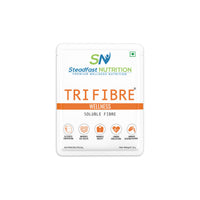Dietary fibre is one of the important essential parts of a well-balanced diet. Our diet should contain a blend of both soluble and insoluble fibre, as both benefit our body in their own individual ways. Soluble fibre has many additional merits as compared to insoluble one, including boosting immune health. We all are well aware of the Coronavirus (COVID-19) outbreak across the world. This deadly virus is threatening and might prove fatal for people with low immunity. Despite taking multiple measures by the Govt. to minimise the spread, the toll rate of people suffering from COVID-19 is rising day-by-day. As per health authorities, the best way to protect ourselves from COVID-19 is to maintain proper hygiene and strengthen our immune health. This is because poor immune health makes us more prone to such viral and bacterial infections.
Adequate intake of dietary fibre might act as a shield against COVID-19. Our immune health is highly dependent upon the gut which is called the ‘second brain’ of the body. Millions of bacteria reside in our gut and it is crucial to maintain a healthy microbial balance. Soluble dietary fibre acts as a prebiotic or food for these healthy microbes. A sufficient amount of dietary fibre promotes the proliferation of probiotics or good microorganisms which in turn, enhances our gut health. Unfortunately, due to unhealthy diets, lifestyle habits and irregular eating patterns, we are unable to meet the daily recommended intake of many macro and micro-nutrients including dietary fibre.
Soluble fibre contributes to boosting our immunity by causing an increase in the production of an anti-inflammatory protein called interleukin-4. In addition, our immune cells become anti-inflammatory which aids in recovering faster from infections. A study published under the British Journal of Nutrition in 2002 mentioned that consumption of prebiotic dietary fibre leads to favourable changes in our immune cells, gut physiology and gut microflora.
When the soluble fibre reaches our gut, it gets fermented by the bacterias present, which in turn results in the production of short-chain fatty acids (SCFAs). Some studies indicate that these SCFAs are useful in countering many viral infections including flu. Fermentation acts as a boon for our bone marrow health where most of our immune cells develop. A study published under the American Journal of Respiratory and Critical Care Medicine examined the effects of dietary fibre on the cough with phlegm. It was conducted on 63,257 Chinese Singaporeans where data concluded that a diet rich in dietary fibre has the potential to reduce the incidence of chronic respiratory symptoms.
To ensure the intake of requisite dietary fibre, Tri Fibre is an excellent option. It is a blend of three soluble fibre - Resistant Maltodextrin, Inulin and Guar Gum, with 100% fermentability. Tri Fibre intake promotes the growth of good microbes like Lactobacillus and Bifidobacterium in the gut. Being flavourless and colourless, Tri Fibre can be taken by anyone including elderly and diabetic people, at any time of the day. It is resistant to heat and acid, therefore one can enjoy the benefits of Tri Fibre in hot, cold beverages and foods as well. It comes in a single sachet serving with convenience to use, carry and store without any hassle.
To sum up, Tri Fibre is an easy and healthy way to uplift our immune health and safeguard us from Coronavirus.
REFERENCES
- Schley, P. D., & Field, C. J. (2002). The immune-enhancing effects of dietary fibres and prebiotics. The British journal of nutrition, 87 Suppl 2, S221–S230. https://doi.org/
- VEITCH, JULIA.(2018).Fibre in diet linked to flu protection.https://www.monash.edu/
- Butler, L. M., Koh, W. P., Lee, H. P., Yu, M. C., & London, S. J. (2004). Dietary fibre and reduced cough with phlegm: a cohort study in Singapore. American journal of respiratory and critical care medicine, 170(3), 279–287. https://doi.org/
- Bergman N, Riley DS, Beidelschies M.(2018).Diet and lifestyle recommendations for the treatment of chronic cough and chronic disease.223685.
- Lesley M. Butler et al. (2006).Prospective Study of Dietary Patterns and Persistent Cough with Phlegm among Chinese Singaporeans. 173(3): 264–270.
- Coronavirus.https://www.who.int/


